The Cambridge History of China. Vol. 13: Republican China 1912-1949, Part 2
Подождите немного. Документ загружается.

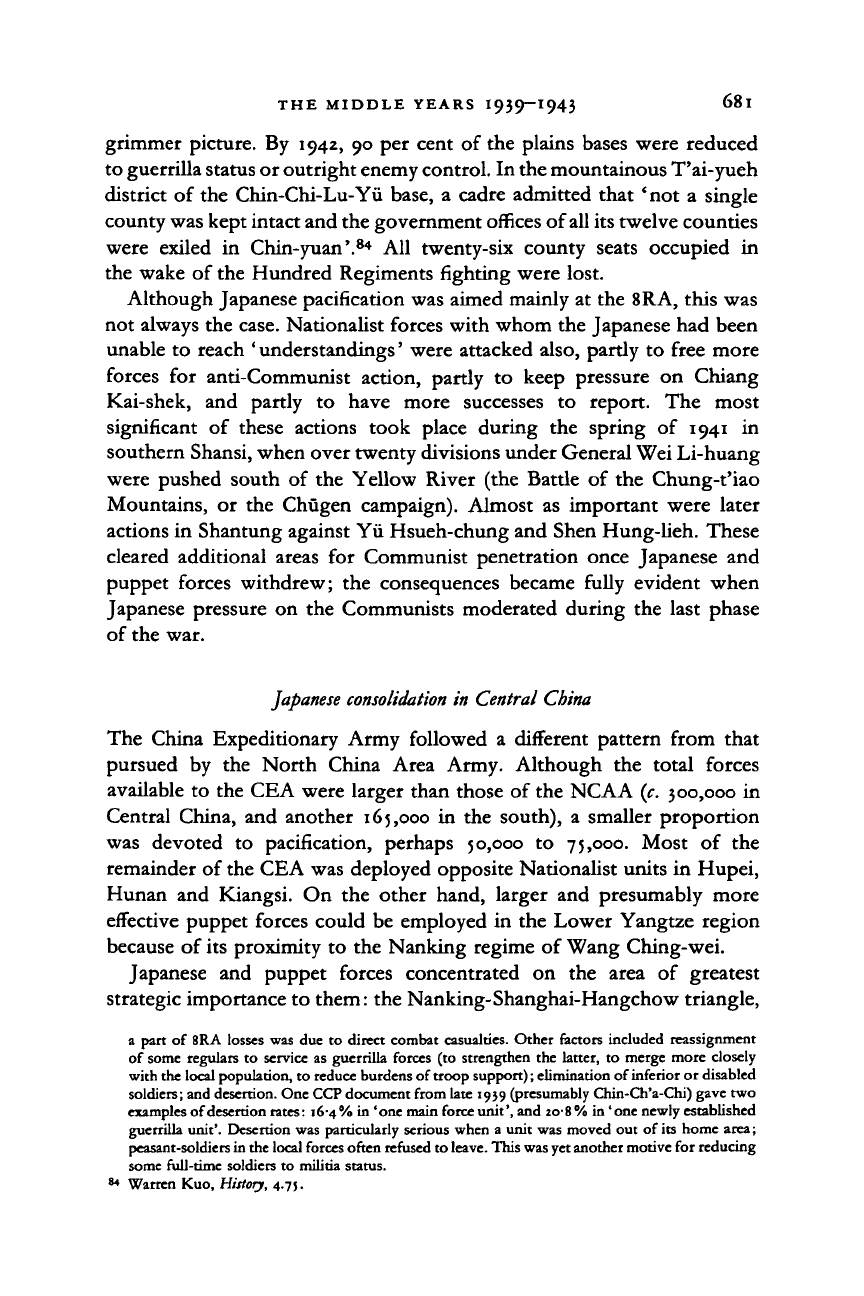
THE MIDDLE YEARS I939-I943
68l
grimmer picture. By 1942, 90 per cent
of
the plains bases were reduced
to guerrilla status or outright enemy
control.
In the mountainous T'ai-yueh
district
of
the Chin-Chi-Lu-Yii base,
a
cadre admitted that ' not
a
single
county was kept intact and the government offices of all its twelve counties
were exiled
in
Chin-yuan'.
84
All
twenty-six county seats occupied
in
the wake of the Hundred Regiments righting were lost.
Although Japanese pacification was aimed mainly at the 8RA, this was
not always the case. Nationalist forces with whom the Japanese had been
unable to reach ' understandings' were attacked also, partly
to
free more
forces
for
anti-Communist action, partly
to
keep pressure
on
Chiang
Kai-shek,
and
partly
to
have more successes
to
report.
The
most
significant
of
these actions took place during
the
spring
of
1941
in
southern Shansi, when over twenty divisions under General Wei Li-huang
were pushed south
of
the Yellow River (the Battle
of
the Chung-t'iao
Mountains,
or
the Chugen campaign). Almost
as
important were later
actions in Shantung against Yii Hsueh-chung and Shen Hung-lieh. These
cleared additional areas
for
Communist penetration once Japanese and
puppet forces withdrew;
the
consequences became fully evident when
Japanese pressure
on
the Communists moderated during the last phase
of the war.
Japanese consolidation
in Central China
The China Expeditionary Army followed
a
different pattern from that
pursued
by the
North China Area Army. Although
the
total forces
available
to
the CEA were larger than those of the NCAA
(c.
300,000
in
Central China, and another 165,000
in
the south),
a
smaller proportion
was devoted
to
pacification, perhaps 50,000
to
75,000. Most
of the
remainder of the CEA was deployed opposite Nationalist units in Hupei,
Hunan
and
Kiangsi.
On the
other hand, larger and presumably more
effective puppet forces could be employed
in
the Lower Yangtze region
because of its proximity to the Nanking regime of Wang Ching-wei.
Japanese
and
puppet forces concentrated
on the
area
of
greatest
strategic importance to them: the Nanking-Shanghai-Hangchow triangle,
a part
of
8RA tosses was due to direct combat casualties. Other factors included reassignment
of some regulars
to
service as guerrilla forces (to strengthen the latter,
to
merge more closely
with the local population, to reduce burdens of
troop
support); elimination of inferior or disabled
soldiers; and desertion. One
CCP
document from late 1939 (presumably Chin-Ch'a-Chi) gave two
examples of desertion rates: 16-4% in 'one main force unit', and 20-8%
in'
one
newly established
guerrilla unit'. Desertion was particularly serious when a unit was moved out of its home area;
peasant-soldiers
in
the local forces often refused to leave. This was
yet
another motive for reducing
some full-time soldiers to militia status.
84
Warren Kuo,
History,
4.7
j.
Cambridge Histories Online © Cambridge University Press, 2008
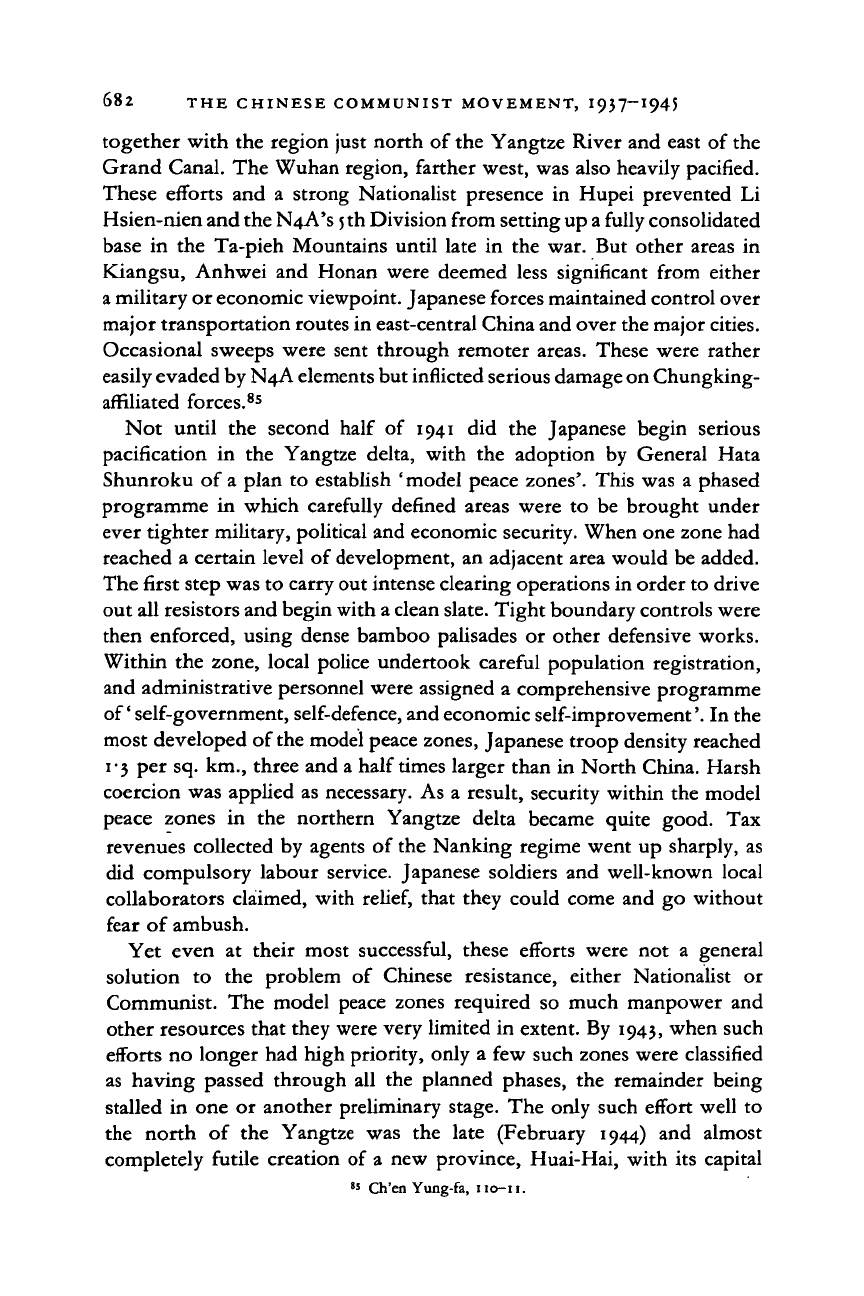
682 THE CHINESE COMMUNIST MOVEMENT, I937-1945
together with the region just north of the Yangtze River and east of the
Grand Canal. The Wuhan region, farther west, was also heavily pacified.
These efforts and a strong Nationalist presence in Hupei prevented Li
Hsien-nien and the N4A's 5 th Division from setting up
a
fully consolidated
base in the Ta-pieh Mountains until late in the war. But other areas in
Kiangsu, Anhwei and Honan were deemed less significant from either
a
military or economic viewpoint. Japanese forces maintained control over
major transportation routes in east-central China and over the major cities.
Occasional sweeps were sent through remoter areas. These were rather
easily evaded by N4A elements but inflicted serious damage on Chungking-
affiliated forces.
85
Not until the second half of 1941 did the Japanese begin serious
pacification in the Yangtze delta, with the adoption by General Hata
Shunroku of a plan to establish ' model peace zones'. This was a phased
programme in which carefully defined areas were to be brought under
ever tighter military, political and economic security. When one zone had
reached a certain level of development, an adjacent area would be added.
The first step was to carry out intense clearing operations in order to drive
out all resistors and begin with a clean slate. Tight boundary controls were
then enforced, using dense bamboo palisades or other defensive works.
Within the zone, local police undertook careful population registration,
and administrative personnel were assigned a comprehensive programme
of' self-government, self-defence, and economic self-improvement'. In the
most developed of the model peace zones, Japanese troop density reached
1*3 per sq. km., three and a half times larger than in North China. Harsh
coercion was applied as necessary. As a result, security within the model
peace zones in the northern Yangtze delta became quite good. Tax
revenues collected by agents of the Nanking regime went up sharply, as
did compulsory labour service. Japanese soldiers and well-known local
collaborators claimed, with
relief,
that they could come and go without
fear of ambush.
Yet even at their most successful, these efforts were not a general
solution to the problem of Chinese resistance, either Nationalist or
Communist. The model peace zones required so much manpower and
other resources that they were very limited in extent. By 1943, when such
efforts no longer had high priority, only a few such zones were classified
as having passed through all the planned phases, the remainder being
stalled in one or another preliminary stage. The only such effort well to
the north of the Yangtze was the late (February 1944) and almost
completely futile creation of a new province, Huai-Hai, with its capital
85
Ch'en Yung-fa,
IIO-II.
Cambridge Histories Online © Cambridge University Press, 2008
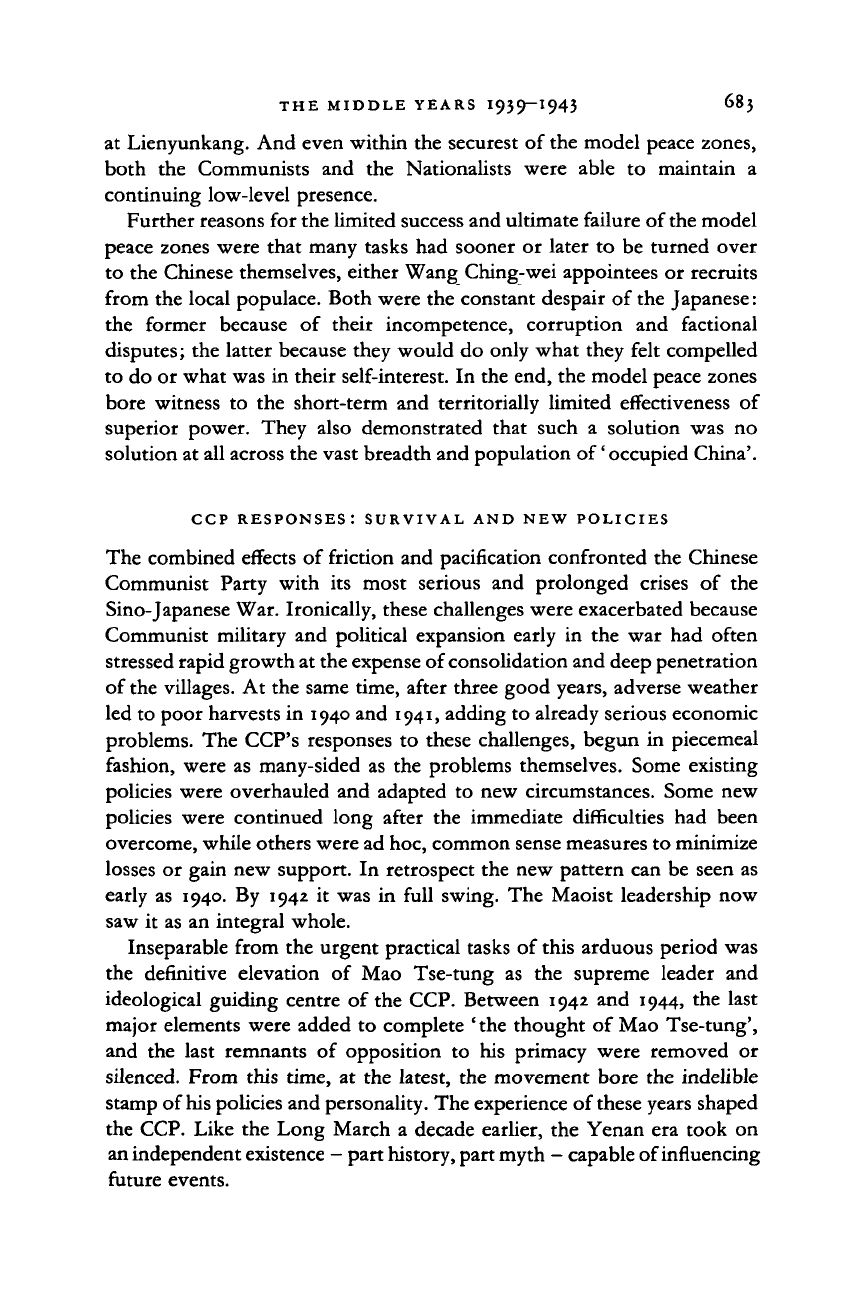
THE MIDDLE YEARS I939-I943 683
at Lienyunkang. And even within the securest of the model peace zones,
both the Communists and the Nationalists were able to maintain a
continuing low-level presence.
Further reasons for the limited success and ultimate failure of
the
model
peace zones were that many tasks had sooner or later to be turned over
to the Chinese themselves, either Wang Ching-wei appointees or recruits
from the local populace. Both were the constant despair of the Japanese:
the former because of their incompetence, corruption and factional
disputes; the latter because they would do only what they felt compelled
to do or what was in their self-interest. In the end, the model peace zones
bore witness to the short-term and territorially limited effectiveness of
superior power. They also demonstrated that such a solution was no
solution at all across the vast breadth and population of 'occupied China'.
CCP
RESPONSES: SURVIVAL AND NEW POLICIES
The combined effects of friction and pacification confronted the Chinese
Communist Party with its most serious and prolonged crises of the
Sino-Japanese War. Ironically, these challenges were exacerbated because
Communist military and political expansion early in the war had often
stressed rapid growth at the expense of consolidation and deep penetration
of the villages. At the same time, after three good years, adverse weather
led to poor harvests in 1940 and
1941,
adding to already serious economic
problems. The CCP's responses to these challenges, begun in piecemeal
fashion, were as many-sided as the problems themselves. Some existing
policies were overhauled and adapted to new circumstances. Some new
policies were continued long after the immediate difficulties had been
overcome, while others were ad hoc, common sense measures to minimize
losses or gain new support. In retrospect the new pattern can be seen as
early as 1940. By 1942 it was in full swing. The Maoist leadership now
saw it as an integral whole.
Inseparable from the urgent practical tasks of this arduous period was
the definitive elevation of Mao Tse-tung as the supreme leader and
ideological guiding centre of the CCP. Between 1942 and 1944, the last
major elements were added to complete ' the thought of Mao Tse-tung',
and the last remnants of opposition to his primacy were removed or
silenced. From this time, at the latest, the movement bore the indelible
stamp of his policies and personality. The experience of these years shaped
the CCP. Like the Long March a decade earlier, the Yenan era took on
an independent existence - part history, part myth - capable of influencing
future events.
Cambridge Histories Online © Cambridge University Press, 2008
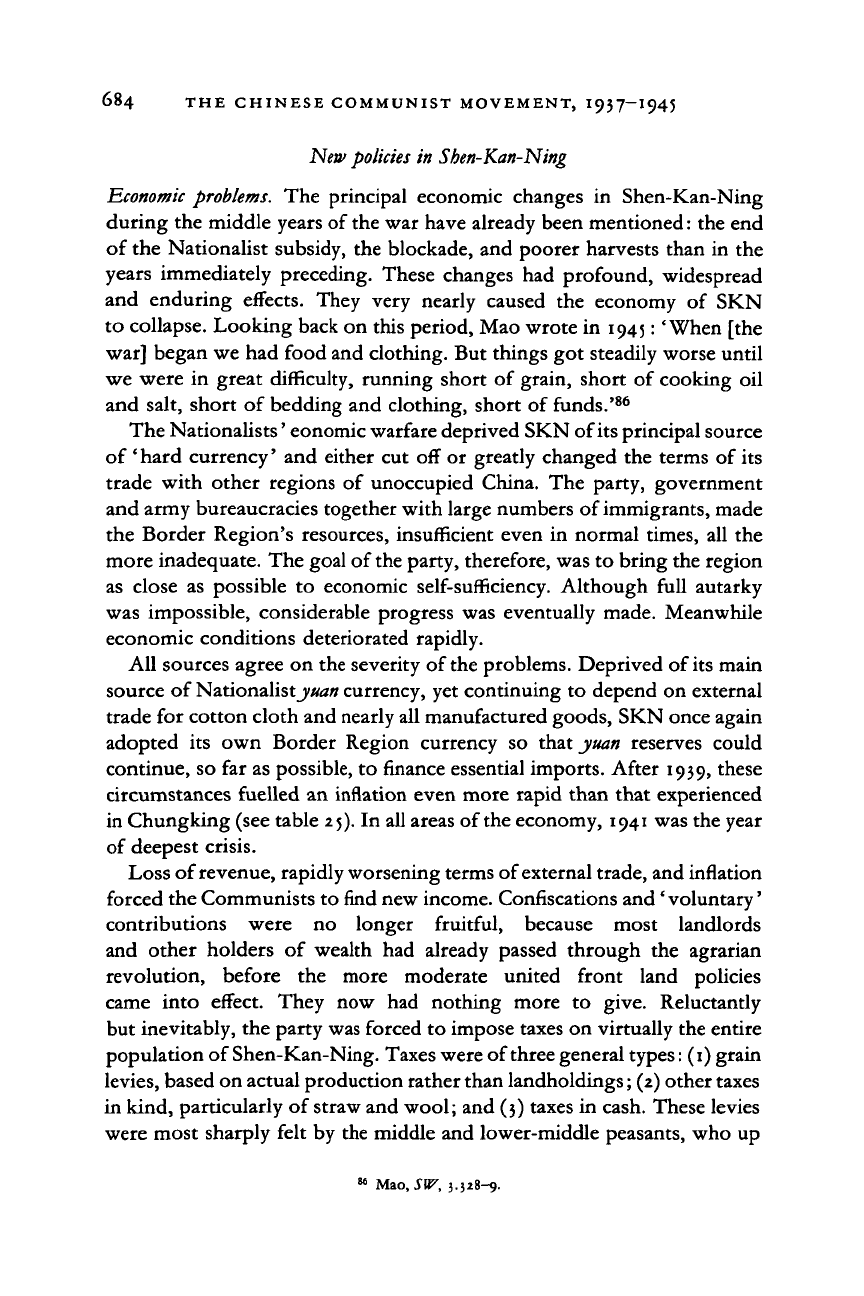
684 THE CHINESE COMMUNIST MOVEMENT, I937-I945
New
policies
in
Shen-
Kan-
Ning
Economic
problems.
The principal economic changes in Shen-Kan-Ning
during the middle years of the war have already been mentioned: the end
of the Nationalist subsidy, the blockade, and poorer harvests than in the
years immediately preceding. These changes had profound, widespread
and enduring effects. They very nearly caused the economy of SKN
to collapse. Looking back on this period, Mao wrote in 1945: 'When [the
war] began we had food and clothing. But things got steadily worse until
we were in great difficulty, running short of grain, short of cooking oil
and salt, short of bedding and clothing, short of funds.'
86
The Nationalists' eonomic warfare deprived SKN of its principal source
of ' hard currency' and either cut off or greatly changed the terms of its
trade with other regions of unoccupied China. The party, government
and army bureaucracies together with large numbers of immigrants, made
the Border Region's resources, insufficient even in normal times, all the
more inadequate. The goal of
the
party, therefore, was to bring the region
as close as possible to economic self-sufficiency. Although full autarky
was impossible, considerable progress was eventually made. Meanwhile
economic conditions deteriorated rapidly.
All sources agree on the severity of the problems. Deprived of
its
main
source of Nationalist yuan currency, yet continuing to depend on external
trade for cotton cloth and nearly all manufactured goods, SKN once again
adopted its own Border Region currency so that yuan reserves could
continue, so far as possible, to finance essential imports. After 1939, these
circumstances fuelled an inflation even more rapid than that experienced
in Chungking (see table 25). In all areas of
the
economy, 1941 was the year
of deepest crisis.
Loss of revenue, rapidly worsening terms of external trade, and inflation
forced the Communists to find new income. Confiscations and' voluntary'
contributions were no longer fruitful, because most landlords
and other holders of wealth had already passed through the agrarian
revolution, before the more moderate united front land policies
came into effect. They now had nothing more to give. Reluctantly
but inevitably, the party was forced to impose taxes on virtually the entire
population of Shen-Kan-Ning. Taxes were of three general types: (1) grain
levies,
based on actual production rather than landholdings; (2) other taxes
in kind, particularly of straw and wool; and (3) taxes in cash. These levies
were most sharply felt by the middle and lower-middle peasants, who up
86
Mao, SW, 3.328-9.
Cambridge Histories Online © Cambridge University Press, 2008
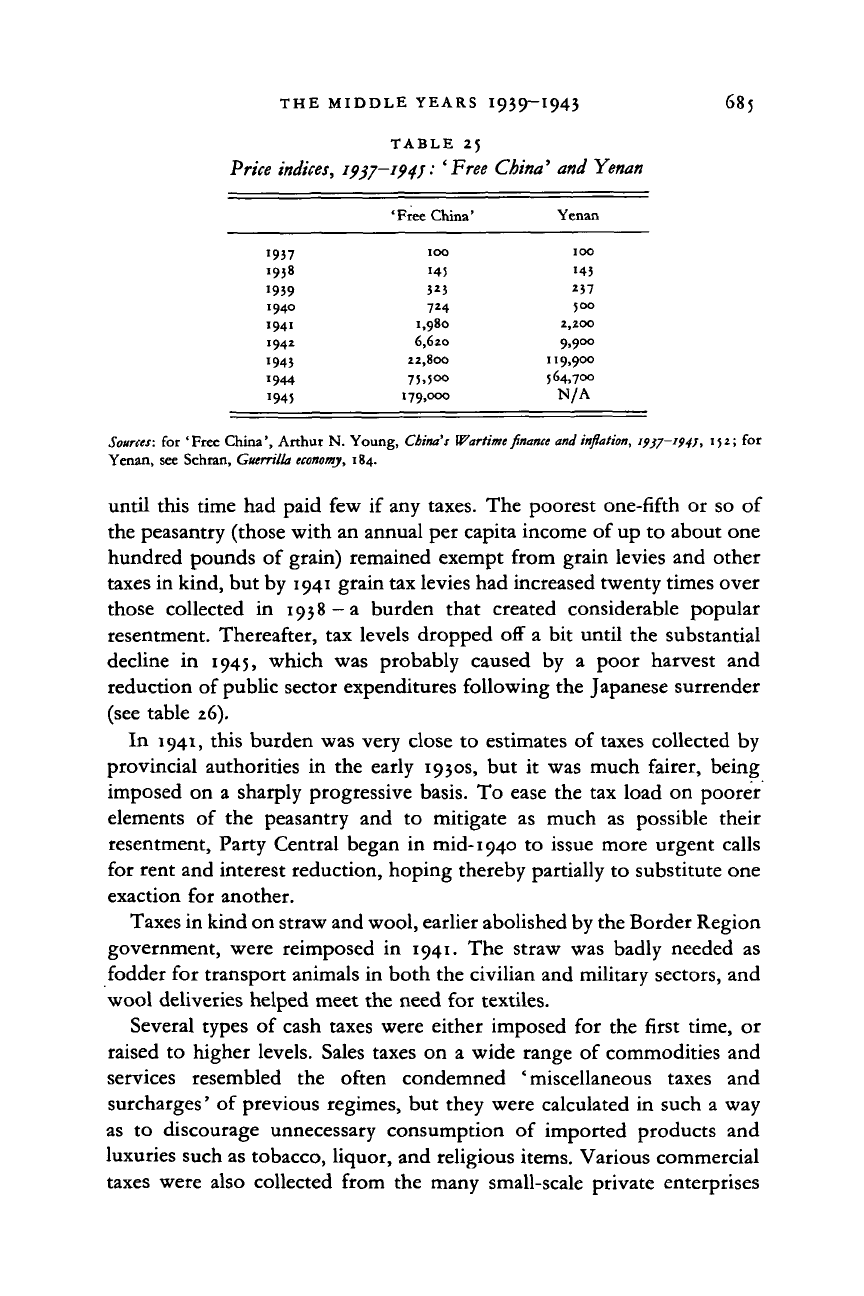
THE MIDDLE YEARS I939-I943 685
TABLE 25
Price
indices,
1937-194j: 'Free China' and Yenan
1937
1938
1959
1940
1941
1942
•94}
'944
1945
'Free China'
100
145
3*3
7*4
1,980
6,620
22,800
75>5°°
179,000
Yenan
100
143
*37
500
2,200
9,900
119,900
564,700
N/A
Sources:
for 'Free China', Arthur N. Young, China's Wartime
finance
and
inflation,
1937-194;,
152;
for
Yenan, see Schran,
Guerrilla
economy,
184.
until this time had paid few
if
any taxes. The poorest one-fifth
or
so of
the peasantry (those with an annual per capita income of up to about one
hundred pounds of grain) remained exempt from grain levies and other
taxes in kind, but by 1941 grain tax levies had increased twenty times over
those collected
in
1938 —a burden that created considerable popular
resentment. Thereafter, tax levels dropped off a bit until the substantial
decline
in
1945, which was probably caused
by a
poor harvest
and
reduction of public sector expenditures following the Japanese surrender
(see table 26).
In 1941, this burden was very close to estimates of taxes collected by
provincial authorities
in
the early 1930s, but
it
was much fairer, being
imposed on
a
sharply progressive basis. To ease the tax load on poorer
elements
of
the peasantry and
to
mitigate
as
much
as
possible their
resentment, Party Central began
in
mid-1940
to
issue more urgent calls
for rent and interest reduction, hoping thereby partially to substitute one
exaction for another.
Taxes in kind on straw and wool, earlier abolished by the Border Region
government, were reimposed
in
1941. The straw was badly needed
as
fodder for transport animals in both the civilian and military sectors, and
wool deliveries helped meet the need for textiles.
Several types
of
cash taxes were either imposed
for
the first time,
or
raised
to
higher levels. Sales taxes on
a
wide range
of
commodities and
services resembled
the
often condemned 'miscellaneous taxes
and
surcharges' of previous regimes, but they were calculated in such a way
as
to
discourage unnecessary consumption
of
imported products and
luxuries such as tobacco, liquor, and religious items. Various commercial
taxes were also collected from the many small-scale private enterprises
Cambridge Histories Online © Cambridge University Press, 2008
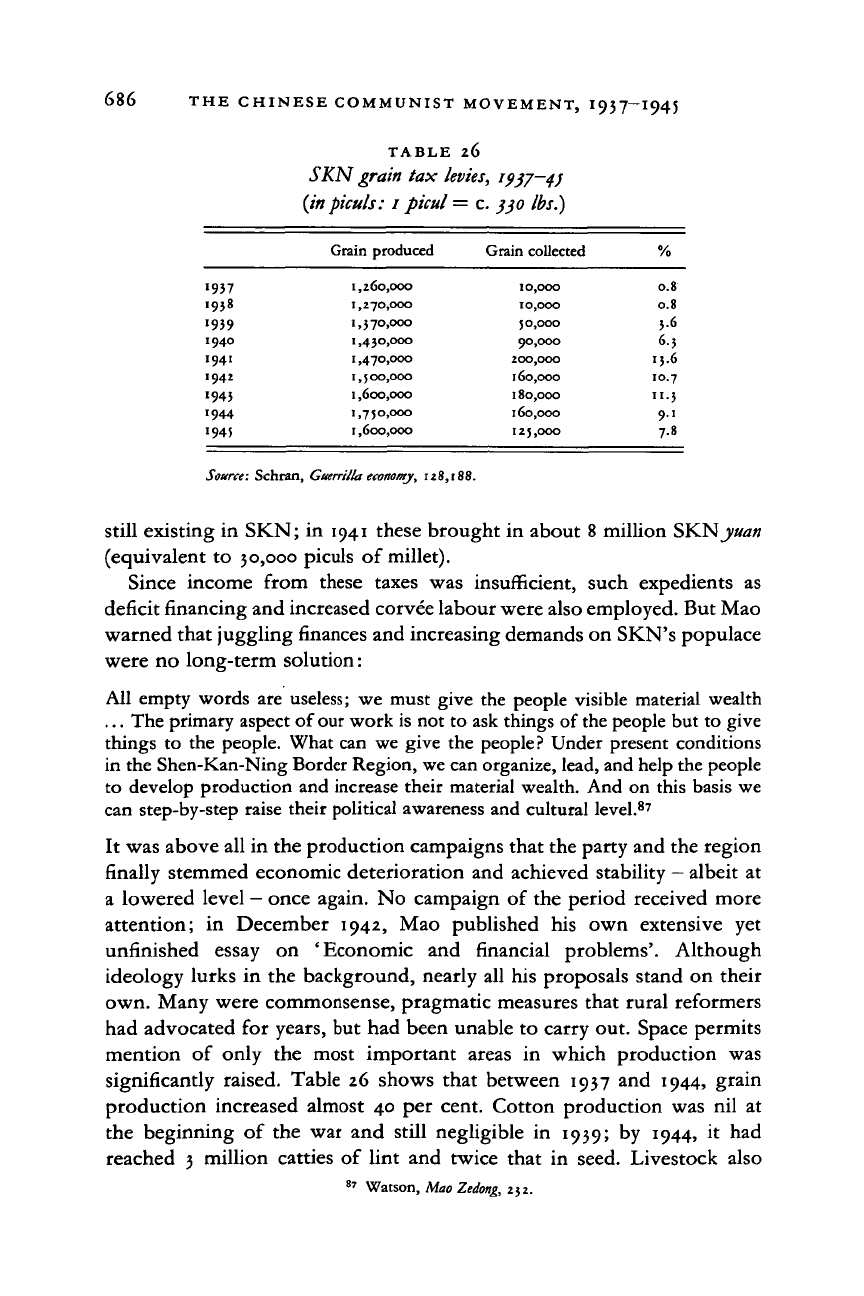
686
THE CHINESE COMMUNIST MOVEMENT, I937-I945
TABLE
26
SKN grain
tax
levies,
1937-4)
(inpiculs:
1
picul
=
c.
}$o lbs.)
'937
1938
•939
1940
1941
1942
1943
1944
1945
Grain produced
,260,000
,270,000
,370,000
,430,000
,470,000
,500,000
,600,000
,750,000
,600,000
Grain collected
10,000
10,000
;
0,000
90,000
200,000
160,000
180,000
160,000
125,000
%
0.8
0.8
3.6
6.3
13.6
10.7
11.3
9'
7.8
Source: Schran, Guerrilla
economy,
128,188.
still existing
in
SKN;
in
1941 these brought
in
about 8 million SKNjuan
(equivalent
to
30,000 piculs
of
millet).
Since income from these taxes
was
insufficient, such expedients
as
deficit financing and increased corvee labour were also employed. But Mao
warned that juggling finances and increasing demands on SKN's populace
were
no
long-term solution:
All empty words are useless; we must give the people visible material wealth
... The primary aspect of
our
work is not to ask things of
the
people but to give
things
to
the people. What can we give the people? Under present conditions
in the Shen-Kan-Ning Border Region, we can organize, lead, and help the people
to develop production and increase their material wealth. And on this basis we
can step-by-step raise their political awareness and cultural level.
87
It was above all in the production campaigns that the party and the region
finally stemmed economic deterioration and achieved stability
—
albeit
at
a lowered level
-
once again.
No
campaign
of
the period received more
attention;
in
December 1942,
Mao
published
his
own
extensive
yet
unfinished essay
on
'Economic
and
financial problems'. Although
ideology lurks
in
the background, nearly all his proposals stand
on
their
own. Many were commonsense, pragmatic measures that rural reformers
had advocated
for
years, but had been unable
to
carry out. Space permits
mention
of
only
the
most important areas
in
which production
was
significantly raised. Table
26
shows that between 1937
and
1944, grain
production increased almost
40 per
cent. Cotton production was
nil
at
the beginning
of
the war and
still negligible
in
1939;
by
1944,
it
had
reached
3
million catties
of
lint
and
twice that
in
seed. Livestock also
87
Watson,
Mao
Zedong,
232.
Cambridge Histories Online © Cambridge University Press, 2008
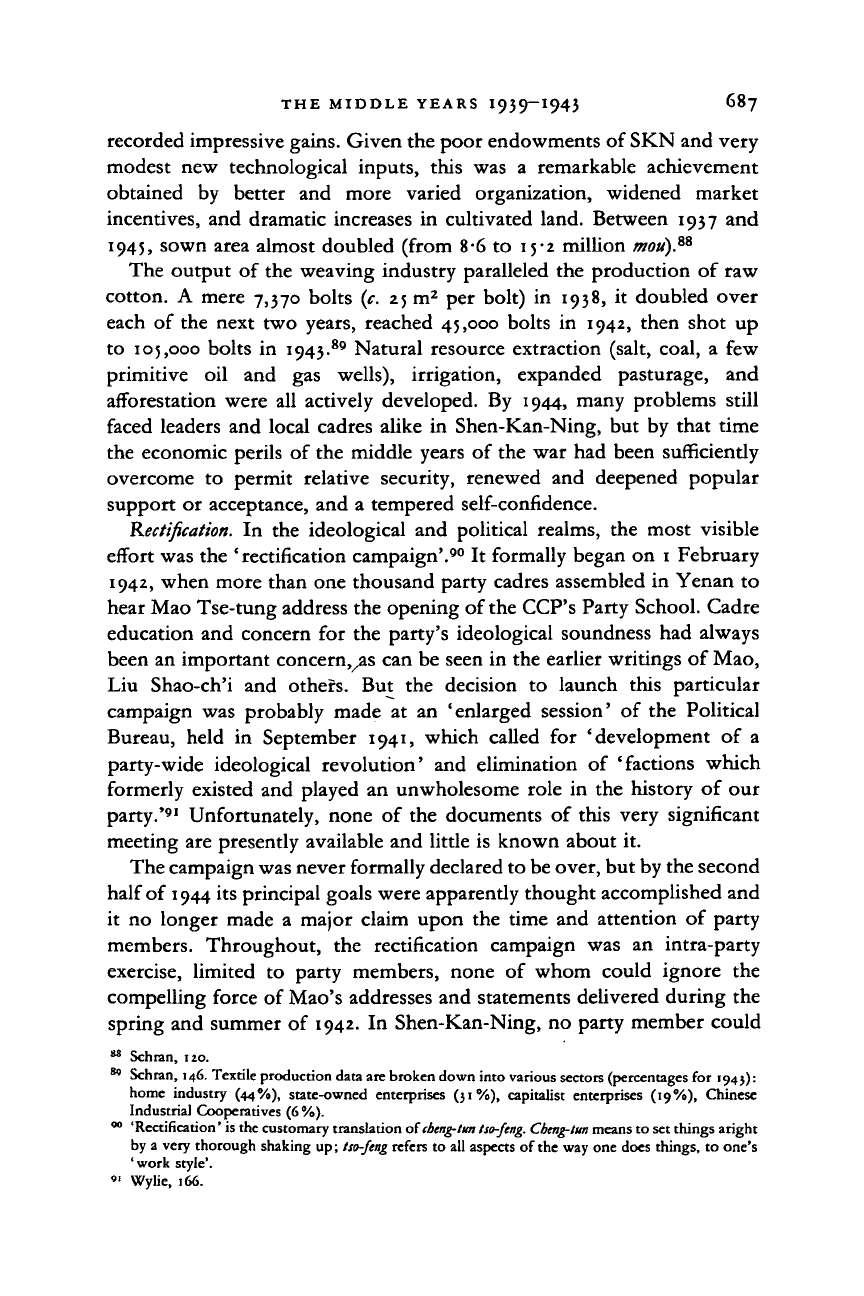
THE MIDDLE YEARS I939-I943 687
recorded impressive gains. Given the poor endowments of SKN and very
modest new technological inputs, this was a remarkable achievement
obtained by better and more varied organization, widened market
incentives, and dramatic increases in cultivated land. Between 1937 and
1945,
sown area almost doubled (from 8-6 to 152 million mou).
ss
The output of the weaving industry paralleled the production of raw
cotton. A mere 7,370 bolts (c. 25 m
2
per bolt) in 1938, it doubled over
each of the next two years, reached 45,000 bolts in 1942, then shot up
to 105,000 bolts in
1943.
89
Natural resource extraction (salt, coal, a few
primitive oil and gas wells), irrigation, expanded pasturage, and
afforestation were all actively developed. By 1944, many problems still
faced leaders and local cadres alike in Shen-Kan-Ning, but by that time
the economic perils of the middle years of the war had been sufficiently
overcome to permit relative security, renewed and deepened popular
support or acceptance, and a tempered self-confidence.
Rectification.
In the ideological and political realms, the most visible
effort was the ' rectification campaign'.
90
It formally began on
1
February
1942,
when more than one thousand party cadres assembled in Yenan to
hear Mao Tse-tung address the opening of the CCP's Party School. Cadre
education and concern for the party's ideological soundness had always
been an important concern.^as can be seen in the earlier writings of Mao,
Liu Shao-ch'i and others. But the decision to launch this particular
campaign was probably made at an 'enlarged session' of the Political
Bureau, held in September 1941, which called for 'development of a
party-wide ideological revolution' and elimination of 'factions which
formerly existed and played an unwholesome role in the history of our
party.'
91
Unfortunately, none of the documents of this very significant
meeting are presently available and little is known about it.
The campaign was never formally declared to be over, but by the second
half of 1944 its principal goals were apparently thought accomplished and
it no longer made a major claim upon the time and attention of party
members. Throughout, the rectification campaign was an intra-party
exercise, limited to party members, none of whom could ignore the
compelling force of Mao's addresses and statements delivered during the
spring and summer of 1942. In Shen-Kan-Ning, no party member could
88
Schran, 120.
M
Schran, 146. Textile production data are broken down into various sectors (percentages for 1943):
home industry (44%), state-owned enterprises (31%), capitalist enterprises (19%), Chinese
Industrial Cooperatives (6%).
90
'Rectification' is the customary translation
oicbeng-tun
tso-jeng.
Cheng-tun
means to set things aright
by a very thorough shaking up;
tso-feng
refers to all aspects of the way one does things, to one's
' work style'.
•' Wylie, 166.
Cambridge Histories Online © Cambridge University Press, 2008
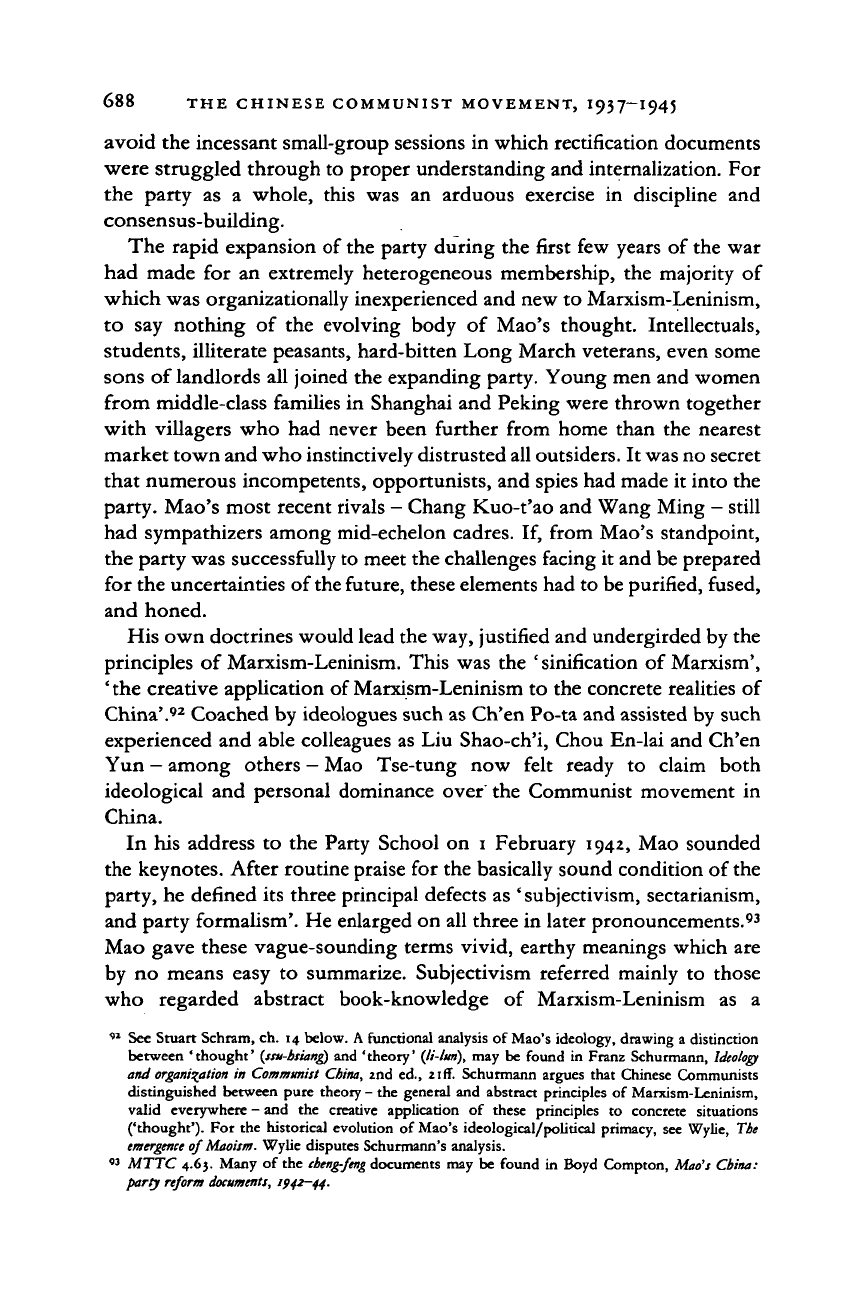
688
THE CHINESE COMMUNIST MOVEMENT, I937—1945
avoid the incessant small-group sessions
in
which rectification documents
were struggled through
to
proper understanding and internalization.
For
the party
as a
whole, this
was an
arduous exercise
in
discipline
and
consensus-building.
The rapid expansion
of
the party during
the
first
few
years
of
the
war
had made
for an
extremely heterogeneous membership,
the
majority
of
which was organizationally inexperienced and new
to
Marxism-Leninism,
to
say
nothing
of the
evolving body
of
Mao's thought. Intellectuals,
students, illiterate peasants, hard-bitten Long March veterans, even some
sons
of
landlords
all
joined the expanding party. Young men and women
from middle-class families
in
Shanghai and Peking were thrown together
with villagers
who had
never been further from home than
the
nearest
market town and who instinctively distrusted all outsiders.
It
was no secret
that numerous incompetents, opportunists, and spies had made
it
into
the
party. Mao's most recent rivals
-
Chang Kuo-t'ao
and
Wang Ming
-
still
had sympathizers among mid-echelon cadres.
If,
from Mao's standpoint,
the party was successfully to meet the challenges facing
it
and be prepared
for the uncertainties
of
the
future, these elements had to be purified, fused,
and honed.
His own doctrines would lead the way, justified and undergirded by the
principles
of
Marxism-Leninism. This
was the
' sinification
of
Marxism',
' the creative application
of
Marxism-Leninism
to the
concrete realities
of
China'.
92
Coached by ideologues such as Ch'en Po-ta and assisted
by
such
experienced
and
able colleagues
as Liu
Shao-ch'i, Chou En-lai
and
Ch'en
Yun
-
among others
-
Mao Tse-tung
now
felt ready
to
claim both
ideological
and
personal dominance over
the
Communist movement
in
China.
In
his
address
to the
Party School
on i
February 1942, Mao sounded
the keynotes. After routine praise
for
the basically sound condition
of
the
party,
he
defined
its
three principal defects
as '
subjectivism, sectarianism,
and party formalism'. He enlarged
on
all three
in
later pronouncements.
93
Mao gave these vague-sounding terms vivid, earthy meanings which
are
by
no
means easy
to
summarize. Subjectivism referred mainly
to
those
who regarded abstract book-knowledge
of
Marxism-Leninism
as a
92
See
Stuart Schram,
ch. 14
below.
A
functional analysis
of
Mao's ideology, drawing
a
distinction
between 'thought' (ssu-hsiang)
and
'theory' (li-lun),
may be
found
in
Franz Schurmann, Ideology
and organisation
in
Communist China,
2nd ed.,
2iff.
Schurmann argues that Chinese Communists
distinguished between pure theory
- the
general
and
abstract principles
of
Marxism-Leninism,
valid everywhere
- and the
creative application
of
these principles
to
concrete situations
('thought').
For the
historical evolution
of
Mao's ideological/political primacy,
see
Wylie,
Tie
emergence
of
Maoism. Wylie disputes Schurmann's analysis.
93
MTTC 4.63. Many
of
the cbeng-feng documents
may
be
found
in
Boyd Compton, Mao's China:
party reform documents, 1)42—44.
Cambridge Histories Online © Cambridge University Press, 2008
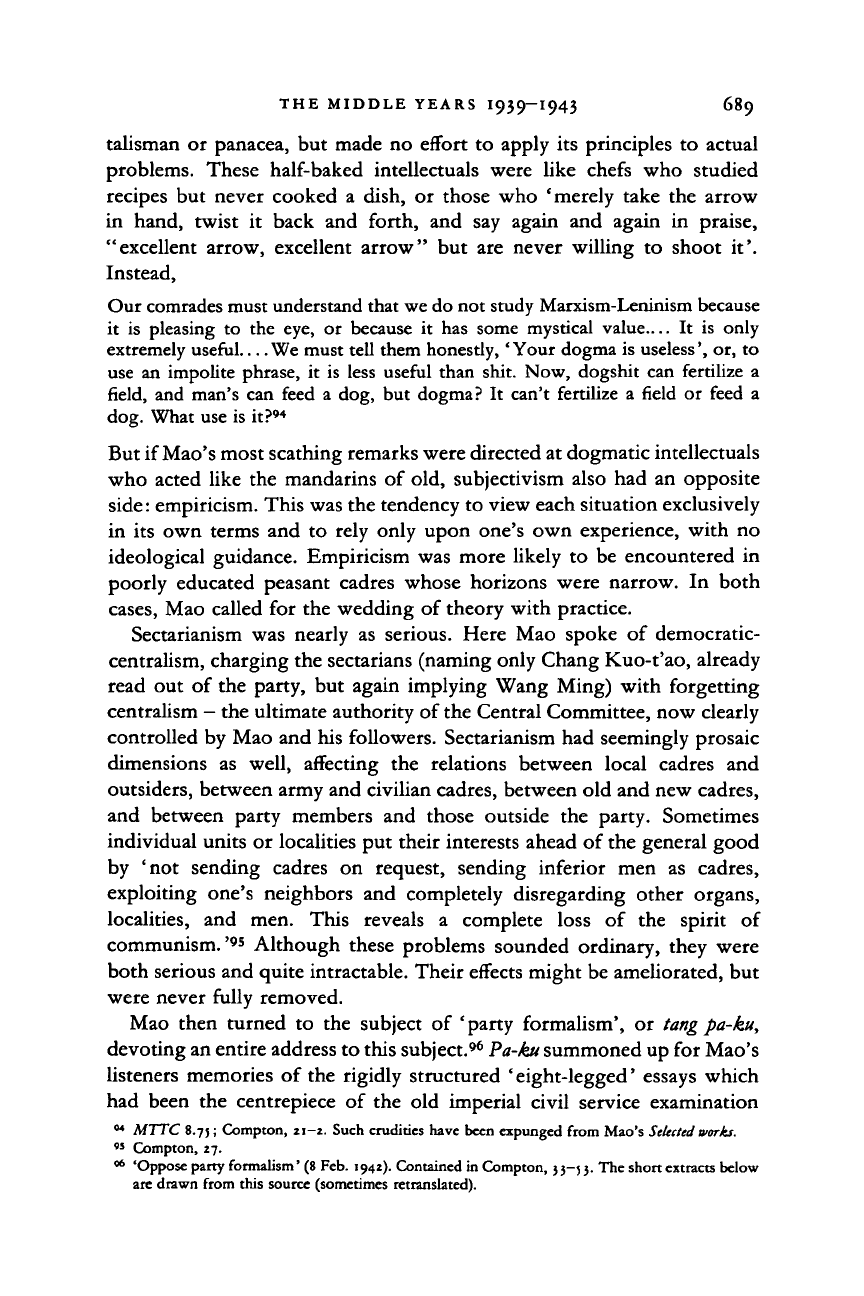
THE MIDDLE YEARS I939-I943 689
talisman or panacea, but made no effort to apply its principles to actual
problems. These half-baked intellectuals were like chefs who studied
recipes but never cooked a dish, or those who 'merely take the arrow
in hand, twist it back and forth, and say again and again in praise,
"excellent arrow, excellent arrow" but are never willing to shoot it'.
Instead,
Our comrades must understand that we do not study Marxism-Leninism because
it is pleasing to the eye, or because it has some mystical value It is only
extremely useful We must tell them honesdy,' Your dogma is useless', or, to
use an impolite phrase, it is less useful than shit. Now, dogshit can fertilize a
field, and man's can feed a dog, but dogma? It can't fertilize a field or feed a
dog. What use is
it?
94
But if Mao's most scathing remarks were directed at dogmatic intellectuals
who acted like the mandarins of old, subjectivism also had an opposite
side:
empiricism. This was the tendency to view each situation exclusively
in its own terms and to rely only upon one's own experience, with no
ideological guidance. Empiricism was more likely to be encountered in
poorly educated peasant cadres whose horizons were narrow. In both
cases,
Mao called for the wedding of theory with practice.
Sectarianism was nearly as serious. Here Mao spoke of democratic-
centralism, charging the sectarians (naming only Chang Kuo-t'ao, already
read out of the party, but again implying Wang Ming) with forgetting
centralism - the ultimate authority of the Central Committee, now clearly
controlled by Mao and his followers. Sectarianism had seemingly prosaic
dimensions as well, affecting the relations between local cadres and
outsiders, between army and civilian cadres, between old and new cadres,
and between party members and those outside the party. Sometimes
individual units or localities put their interests ahead of the general good
by 'not sending cadres on request, sending inferior men as cadres,
exploiting one's neighbors and completely disregarding other organs,
localities, and men. This reveals a complete loss of the spirit of
communism.'
95
Although these problems sounded ordinary, they were
both serious and quite intractable. Their effects might be ameliorated, but
were never fully removed.
Mao then turned to the subject of ' party formalism', or
tang
pa-ku,
devoting an entire address to this subject.
96
Pa-ku
summoned up for Mao's
listeners memories of the rigidly structured 'eight-legged' essays which
had been the centrepiece of the old imperial civil service examination
** MTTC 8.75; Compton, 21—2. Such crudities have been expunged from Mao's
Selected
works.
*
5
Compton, 27.
96
'Oppose party formalism' (8 Feb. 1942). Contained in Compton, 33-53. The short extracts below
are drawn from this source (sometimes retranslated).
Cambridge Histories Online © Cambridge University Press, 2008
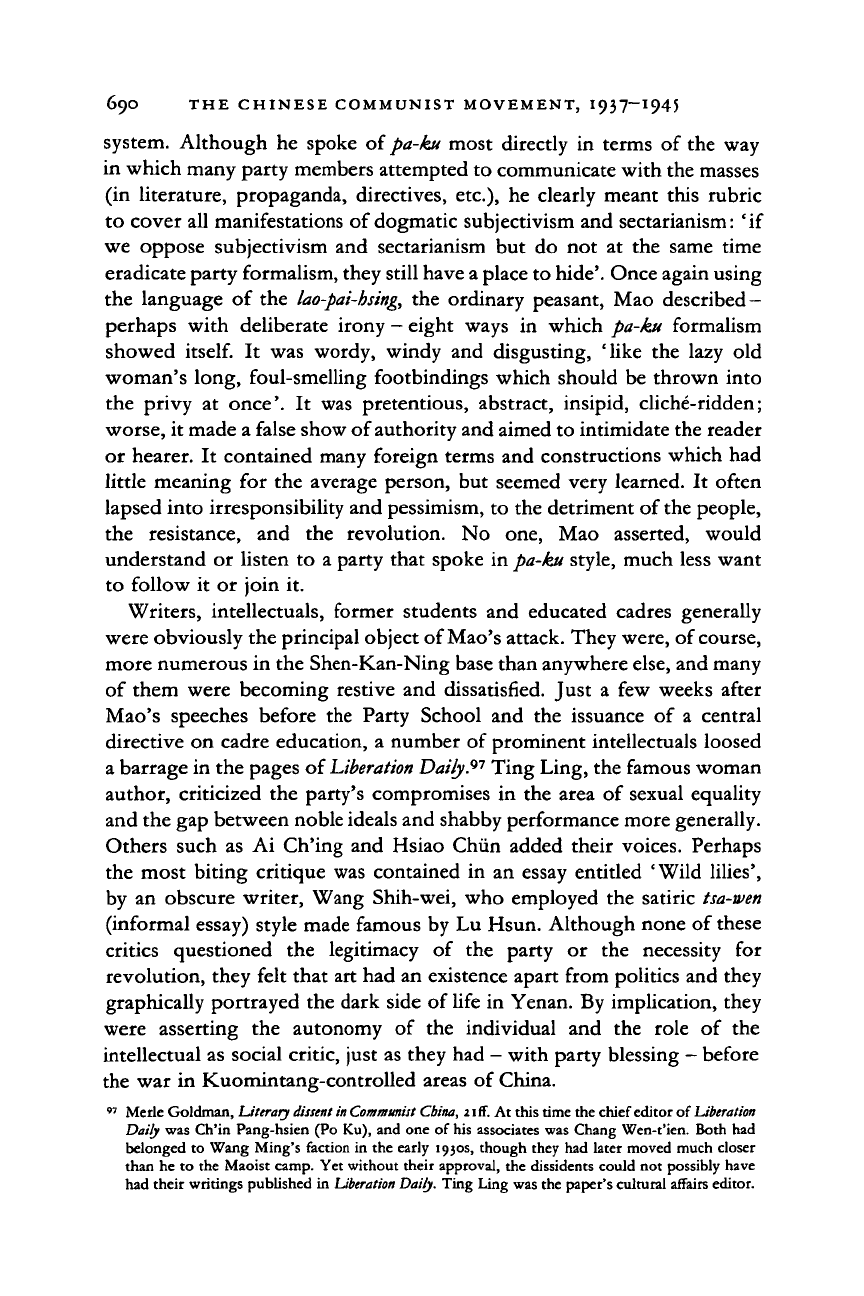
690 THE CHINESE COMMUNIST MOVEMENT, I937-1945
system. Although
he
spoke of pa-ku most directly
in
terms
of
the way
in which many party members attempted to communicate with the masses
(in literature, propaganda, directives, etc.), he clearly meant this rubric
to cover all manifestations of dogmatic subjectivism and sectarianism:
'if
we oppose subjectivism and sectarianism but
do
not
at
the same time
eradicate party formalism, they still have a place to hide'. Once again using
the language
of
the
lao-pai-hsing,
the ordinary peasant, Mao described
-
perhaps with deliberate irony
-
eight ways
in
which pa-ku formalism
showed
itself.
It
was wordy, windy and disgusting, 'like the lazy old
woman's long, foul-smelling footbindings which should be thrown into
the privy
at
once'.
It
was pretentious, abstract, insipid, cliche-ridden;
worse, it made a false show of authority and aimed to intimidate the reader
or hearer.
It
contained many foreign terms and constructions which had
little meaning for the average person, but seemed very learned.
It
often
lapsed into irresponsibility and pessimism, to the detriment of the people,
the resistance,
and the
revolution.
No one, Mao
asserted, would
understand
or
listen to a party that spoke in pa-ku style, much less want
to follow
it or
join
it.
Writers, intellectuals, former students and educated cadres generally
were obviously the principal object of Mao's attack. They were, of course,
more numerous in the Shen-Kan-Ning base than anywhere else, and many
of them were becoming restive and dissatisfied. Just
a
few weeks after
Mao's speeches before the Party School and the issuance
of a
central
directive on cadre education,
a
number of prominent intellectuals loosed
a barrage in the pages of
Liberation
Daily.
91
Ting Ling, the famous woman
author, criticized the party's compromises
in
the area
of
sexual equality
and the gap between noble ideals and shabby performance more generally.
Others such
as
Ai Ch'ing and Hsiao Chun added their voices. Perhaps
the most biting critique was contained
in
an essay entitled 'Wild lilies',
by an obscure writer, Wang Shih-wei, who employed the satiric
tsa-wen
(informal essay) style made famous by Lu Hsun. Although none of these
critics questioned
the
legitimacy
of the
party
or the
necessity
for
revolution, they felt that art had an existence apart from politics and they
graphically portrayed the dark side of life in Yenan. By implication, they
were asserting
the
autonomy
of the
individual
and the
role
of the
intellectual as social critic, just as they had
—
with party blessing
—
before
the war in Kuomintang-controlled areas of China.
" Merle Goldman,
LJterary dissent in Communist
China,
2 iff. At this time the chief editor of
Liberation
Daily was Ch'in Pang-hsien (Po Ku), and one of his associates was Chang Wen-t'ien. Both had
belonged to Wang Ming's faction in the early 1930s, though they had later moved much closer
than he to the Maoist camp. Yet without their approval, the dissidents could not possibly have
had their writings published in
Liberation
Daily.
Ting Ling was the paper's cultural affairs editor.
Cambridge Histories Online © Cambridge University Press, 2008
